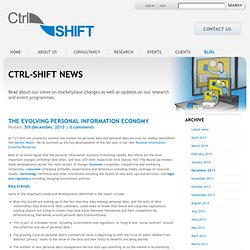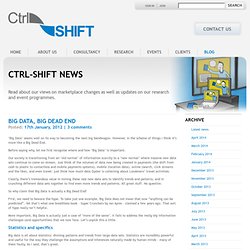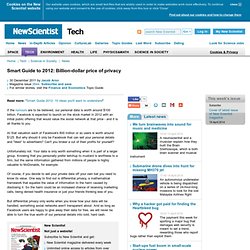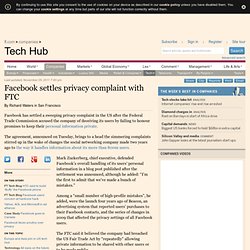

A brief future of citizenship. Williamheath: Here you go @JoelGurin ... The evolving Personal Information Economy. At Ctrl-Shift we constantly monitor the market for personal data and personal data services via weekly newsletters like Market Watch.

We’ve summed up the key developments of the last year in our new Personal Information Economy Round-Up. Most of us would agree that the personal information economy is evolving rapidly. But where are the most important changes unfolding? And when, and how, will their impacts be most sharply felt? The Round-Up reviews these developments across four main drivers of change: business (corporate, competitive and marketing initiatives), consumer (changing attitudes, expectations and behaviours including media coverage of consumer issues), technology (technical and other innovations including the launch of new start-ups and services), and legal and regulatory including changing Government policies.
Key trends Some of the important trends and developments identified in the report include: Serious strategic intent. Britain's Smart Meter Programme: A Case Study in Privacy by Design by Ian Brown. University of Oxford - Oxford Internet InstituteFebruary 12, 2013 International Review of Law, Computers & Technology, Forthcoming Abstract:

CIC sits down with Simon Tucker (CEO of The Young Foundation) and talk about Personal Data. Berners-Lee says snoop could see spies blackmail soldiers. High performance access to file storage World Wide Web inventor Sir Tim Berners-Lee has declared government collection of data on citizens web surfing and telephony activities “a very bad idea” after outlining a scenario in which he feels national security could be compromised by caches of armed forces' members online activities.

Law And Technology: PERSONAL DATA PROTECTION ACT 2010: BUSINESS AS USUAL? Professor Abu Bakar Munir Malaysia is the first among the countries in ASEAN to have a law governing the processing of personal information.

The Personal Data Protection Act (PDPA) passed in June 2010 is expected to be in force soon, this year. The PDPA sets out principles as a good information handling practice that must be followed whenever personal data is processed for commercial purposes. The law applies only if the data or information processed is a ‘personal data’, which is data or information that relate directly or indirectly to an individual.
At the heart of the Act are the seven data protection principles which must be observed by companies when processing personal data of their customers, staff members, etc. Companies are also required to have privacy policy statements and not allowed to disclose information for other purpose or disclose it to a third party without the consent of the individual. Armando Iannucci calls on BBC to fight back against critics. Armando Iannucci said 'supine' television executives had failed to fight back – not just at the BBC but across broadcasting.

Photograph: Suki Dhanda for the Guardian The Thick Of It creator Armando Iannucci has called on the BBC to fight back against its critics in parliament and the press. Iannucci, whose acclaimed Westminster satire returned to BBC2 last Saturday night, said British television felt "disarmed and confused" because of "consistent cack-handed interference by politicians goaded by the press". He said "supine" television executives had failed to fight back – not just at the BBC but across broadcasting – and said "now is the time to fight back". Delivering the annual Bafta Lecture in London's Piccadilly, entitled "Fight, fight, fight", Iannucci railed against politicians and press barons trying to influence what we see on the small screen.
Big Data, Big Dead End / News / What we do. ‘Big Data’ seems well on its way to becoming the next big bandwagon.

However, in the scheme of things I think it’s more like a Big Dead End. Before saying why, let me first recognise where and how ‘Big Data’ is important. Our society is transitioning from an ‘old normal’ of information scarcity to a ‘new normal’ where massive new data sets continue to come on stream. Big Data age puts privacy in question as information becomes currency. This month, the US chain Walmart bought the startup Social Calendar, one of the most popular calendar apps on Facebook, which lets users record special events, birthdays and anniversaries.

More than 15 million registered users have posted over 110m personal notifications, and users receive email reminders totalling over 10m a month. Of course, when a Social Calendar user listed a friend's birthday or details of a holiday to Malaga, she or he probably had no idea the information would end up in the hands of a US supermarket. But now it will be cross-referenced with Walmart's own data, plus any other databases that are available, to generate a compelling profile of individual Social Calendar users and their non-Social Calendar-using friends. Smart Guide to 2012: Billion-dollar price of privacy. Read more: "Smart Guide 2012: 10 ideas you'll want to understand" If the rumours are to be believed, our personal data is worth around $100 billion.

Facebook is expected to launch on the stock market in 2012 with an initial public offering that would value the social network at that price - and it is all thanks to you. Exploring value exchange: Can we put a price on data? - Mycustomer.com. Are your customers aware of the value of their data and their role in a value exchange model?

And if not, should they be? In the first article of this series we discussed the existence of a value exchange, and the ambition of brand marketers to elevate their relationship with consumers from a commercial to an emotional one. What is clear is that wherever a particular brand is on this journey; information and data are critical elements in helping them understand customers. Without these elements, any form of interaction will simply not work. Facebook settles privacy complaint with FTC. Facebook has settled a sweeping privacy complaint in the US after the Federal Trade Commission accused the company of deceiving its users by failing to honour promises to keep their personal information private.

The agreement, announced on Tuesday, brings to a head the simmering complaints stirred up in the wake of changes the social networking company made two years ago to the way it handles information about its more than 800m users. Mark Zuckerberg, chief executive, defended Facebook’s overall handling of its users’ personal information in a blog post published after the settlement was announced, although he added: “I’m the first to admit that we’ve made a bunch ofmistakes.” Why Your Personal Data Is The New Oil. Remove Personal Information from the Web. About. 13944 - YawnOn Consumer Data Sales Platform Launches.
In the US, a new firm called YawnOn has been launched, through which consumers can sell their personal data, information and opinions. The company invites consumers to share their information through completion of an online questionnaire, and the resulting data is then marketed to relevant companies by YawnOn. Consumers who join YawnOn will be offered a choice of levels and compensation. At the most basic level, they simply provide a name, address and e-mail address. At higher levels, they provide information about their buying habits and opinions about specific kinds of products and services. YawnOn will pay its members on a sliding scale, so that the more information a member is willing to provide, the more they will earn. The firm has been set up by John Rochon Jr, whose background includes experience with financial analysis, mergers and acquisitions, and business operations.
DMA: Data capture suffers as consumers opt for online anonymity. Apple sued over iPad and iPhone app 'data leaks' 29 December 2010Last updated at 11:32 Apple should do more to enforce its privacy policy, say complainants Two groups of iPhone and iPad users are suing Apple saying apps for the gadgets leak personally identifiable data. The groups want to stop personal data being passed around without owners being notified or compensated. Apple is just one of six application makers being pursued by the two groups of consumers. The legal firm putting together one class action lawsuit said it might also take action against Google over data leaking from Android applications. Backflip Studios, the Weather Channel, Dictionary.com and others were named in court papers supporting the lawsuits.
The papers allege that many applications collect so much personal data that users can be individually identified. The complainants said many firms, including advertisers, were managing to track and identify individuals via the unique device ID Apple assigns to every gadget. Apple has yet to respond to requests for comment. FTC 'do not track' proposals. Phil Windley's Technometria. There was a lot of discussion around Personal Data Stores (PDS) and Personal Data Lockers at IIW East. Every time slot on both days had at least one and sometimes two sessions on the subject. (As an aside, if you're not familiar with IIW, the agenda is created in real time, by the participants, not months in advance by a program committee, so it represents more fully the interests of the participants than a normal conference aganda might.) Do A Total Background Check On Yourself.
Life is better ON - Lifeisbetteron. Iosf — Internet of subject. Car-based social networking could revolutionise motor marketing. They're expensive to run, spending much of their time idle, and most people would be better off getting cabs, or using a car club. Justified by the occasions when alternative modes of transport would be inconvenient, a car works out as an expensive indulgence. Yet, our relationship with cars is more complex than that. If reliability and economy were vital, you'd never see an Alfa Romeo on the street.
Levi's knows this; after years of talking about the practical benefits of its jeans, putting Nick Kamen in them (or more to the point, getting him out of them) did far more for sales. It turned out that what people wanted to know from jeans advertising was simple: were they going to get laid in them? However cars are isolation booths - execuboxes for the nose-pickerati to crawl along the A40 in the rush hour.